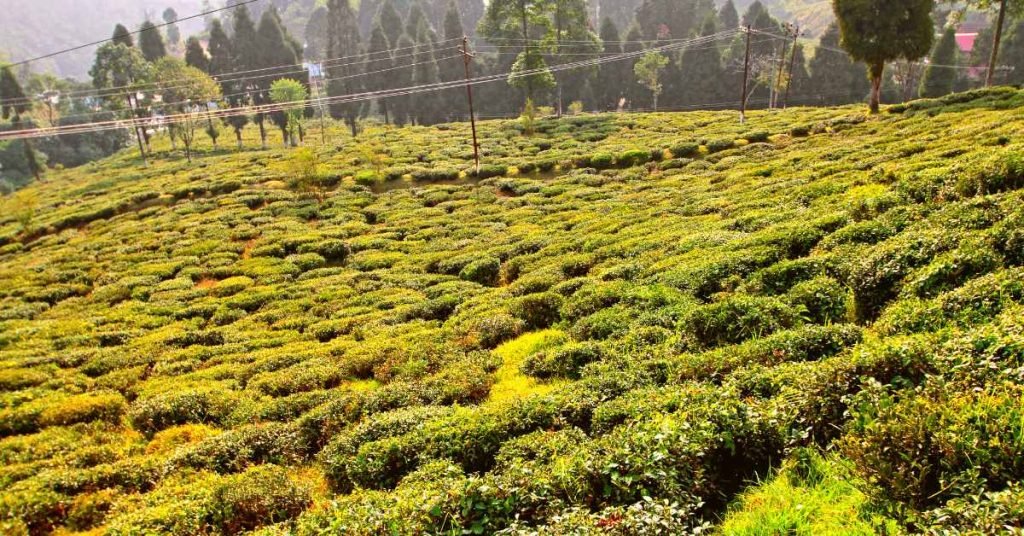Tea has an extraordinary ability to transport us to distant lands, awakening our senses with every sip.
Coming from an enchanting Darjeeling region in India, this elixir has captivated tea enthusiasts for centuries, offering a delightful blend of flavors, a distinct character, and a multitude of health benefits.
Join us on a journey as we uncover the fascinating world of Darjeeling tea, a treasure trove of history, interesting facts, and the undeniable charm it brings to your teacup.
The Champagne of Teas

Darjeeling tea is often referred to as the “Champagne of Teas,” owing to its unparalleled quality and distinctive characteristics.
Grown in the misty mountain slopes of the Darjeeling region, this tea boasts a delicate and aromatic flavor profile that sets it apart from any other tea in the world.
With its floral notes, muscatel flavor, and a hint of astringency, Darjeeling tea offers a truly unique and memorable tea-drinking experience.
Geographical Blessings
What makes this tea so exceptional is its geographical location.
Situated in the Indian state of West Bengal, at an altitude of 6,000 feet above sea level, Darjeeling enjoys a combination of cool temperatures, ample rainfall, and the perfect amount of sunlight.
These climatic conditions, along with the rich, loamy soil, provide the ideal environment for cultivating tea bushes and nurturing the leaves that produce this exquisite brew.
The Flushes of Flavor

Darjeeling tea is harvested during different flushes or seasons, each offering a distinct character and flavor profile. The first flush, also known as the “Spring Flush,” occurs in early spring and produces a light, delicate tea with floral and fruity notes.
The second flush, or “Summer Flush,” harvested in late spring or early summer, yields a fuller-bodied tea with muscatel flavors.
The autumnal flush, harvested in autumn, is less well-known but still produces a rich and flavorful cup.
Each flush has its own devoted fan base, and connoisseurs eagerly await the arrival of each season to savor the nuances of Darjeeling tea.
Health Benefits Worth Sipping For
Beyond its enchanting taste, Darjeeling tea offers an array of health benefits. Rich in antioxidants, this tea helps combat free radicals and supports overall well-being.
It may aid digestion, promote a healthy heart, and boost metabolism. With its modest caffeine content, Darjeeling tea provides a gentle energy boost without the jitters associated with coffee.
Additionally, it contains beneficial compounds like polyphenols and catechins, which have been linked to potential cancer-fighting properties and improved cognitive function.
The Art of Tea Gardens

Exploring the lush tea gardens of Darjeeling is an experience in itself. Spread across rolling hills, these tea estates not only offer breathtaking vistas but also provide a glimpse into the meticulous process of tea production.
From the plucking of the tender tea leaves to their withering, rolling, oxidation, and drying, every step is meticulously executed by skilled tea artisans.
Visitors can immerse themselves in the world of tea by taking guided tours, participating in tea-tasting sessions, and even witnessing the tea-plucking process firsthand.
How Many Cups of Darjeeling Can I Drink Per Day?
When it comes to consuming Darjeeling tea or any type of tea, moderation is key.
While Darjeeling tea offers numerous health benefits, it’s important to keep in mind that it still contains caffeine, which depends on the brewing time.
As a general guideline, it is advisable to limit your daily intake of caffeine to moderate levels. Up to 400 milligrams (mg) of caffeine daily is considered safe according to the F.D.A.
However, individual sensitivities to caffeine can vary, and some people may be more sensitive to its effects.
Darjeeling tea has a lower caffeine content than coffee but higher than herbal teas. On average, an 8-ounce cup of Darjeeling tea may contain around 30-50 mg of caffeine, although these values can vary.

Considering the caffeine content, it is recommended to consume Darjeeling tea in moderation. It’s generally safe to enjoy 2-3 cups of Darjeeling tea per day without experiencing adverse effects.
However, if you are particularly sensitive to caffeine or have any underlying health conditions, it’s best to consult with your healthcare provider for personalized advice on caffeine consumption.
Remember that factors such as steeping time, water temperature, and tea strength can affect the caffeine levels in your cup.
If you prefer a milder cup of tea, you can reduce the caffeine content by steeping the tea for a shorter duration or opting for lighter flushes of Darjeeling tea.
Final Word
Darjeeling tea is more than just a beverage; it’s a window to the extraordinary beauty and craftsmanship of a region blessed with natural wonders.
From its unmatched flavor and aroma to its fascinating cultivation and rich history, every aspect of Darjeeling tea tells a story.
So, the next time you savor a cup of this golden elixir, take a moment to appreciate the legacy, craftsmanship, and natural splendor encapsulated within—Darjeeling tea, the epitome of tea’s majesty.
Medical Disclaimer
Itsnevernotteatime.com cannot and does not contain medical/health advice. The medical/health information is provided for general and educational purposes only and is not a substitute for professional advice.
Statements made on this website regarding the herbal and natural products offered on this website have not been evaluated by the food and drug administration as the FDA does not evaluate or test herbs. This information has not been evaluated by the US Food and Drug Administration, nor has it gone through the rigorous double-blind studies required before a particular product can be deemed truly beneficial or potentially dangerous and prescribed in the treatment of any condition or disease.
It is not meant to substitute for medical advice or diagnosis provided by your physician or other medical professionals. Do not use this information to diagnose, treat or cure any illness or health condition.
Accordingly, before taking any actions based upon such information, we encourage you to consult with the appropriate professionals. We do not provide any kind of medical/health advice. The use or reliance of any information contained on this site is solely at your own risk.
Please visit this FDA website to clear any confusions you have about food and dietary products and their ingredients:
Please visit this FDA website to clear any confusions you have about food and dietary products and their ingredients: https://www.fda.gov/Food/DietarySupplements/default.htm
MEDICAL DISCLAIMER
Itsnevernotteatime.com cannot and does not contain medical/health advice. The medical/health information is provided for general and educational purposes only and is not a substitute for professional advice.




